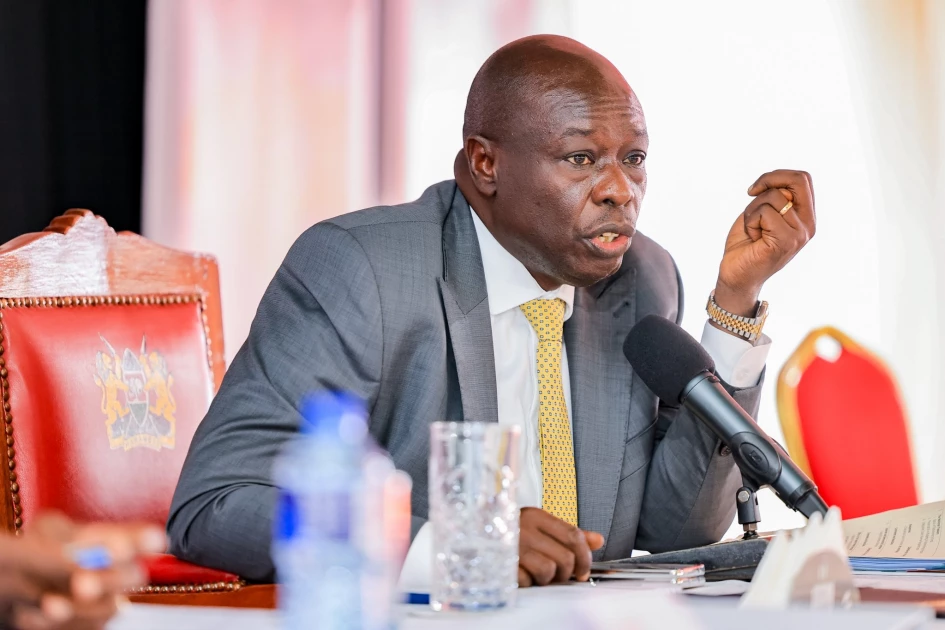DP Gachagua urges governors to support coffee reforms

Deputy President Rigathi Gachagua attends the 23rd Intergovernmental Budget and Economic Council engagement at his official residence in Karen, Nairobi on May 6, 2024. | DPPS

Audio By Vocalize
Deputy
President Rigathi Gachagua on Monday pleaded with governors to support the national
government’s bid to transfer the mandate of licensing bars and liquor
businesses from county governments to the state anti-drug agency.
Mr Gachagua
also asked the county bosses to back the ongoing reforms in the coffee
sub-sector, stating that some counties were undermining the process by issuing
multiple trading licences to millers and marketers.
“We must
stick to the interventions that we agreed on to ensure success in the reforms
in the coffee sub-sector. Some counties like Kiambu and Uasin Gishu have gone
contrary to what we agreed, including issuing multiple licenses to actors in
the value chain. We agreed that millers cannot be marketers, but some have been
issued with multiple licenses to mill and market coffee. Let us work together
to ensure the reforms succeed,” he stated.
He spoke
during the 23rd Ordinary Session of the Intergovernmental Budget and Economic
Council (IBEC) meeting at the Official Residence in Karen, where he was
accompanied by top government officials.
In the
fight against illicit brews and drug abuse, the Deputy President said the national
government intends to amend the Alcoholic Drinks Control Act to tighten control
of manufacturing, distribution, sale and consumption of liquor drinks following
the proliferation of killer drinks.
“The
government is implementing measures on curbing illicit brews, drugs and
substance abuse. We are seeking your support and cooperation in this
initiative. It is our proposal that the mandate of licensing bars and liquor
businesses be spearheaded by the National Authority for the Campaign Against
Drug and Alcohol Abuse (NACADA), but the mandate of revenue collection goes to
County Governments,” said Mr Gachagua.
“We need
your help in regulating the sale of alcohol so that every establishment is not
turned into a bar. Before taking the proposed amendment to Parliament, it will
be given to the Council of Governors for input. We want a sober nation for
socio-economic development,” he added.
He
explained that of concern to the government is the second-generation alcoholic
drinks, which have not only resulted in the deaths of people besides other
grave socio-economic effects.
In February
this year, at least 17 people in Kangai Village, Kirinyaga County, died after
consuming illicit brew.
Mr Gachagua
said the trade, consumption, and abuse of illicit alcohol, narcotics drugs and
psychotropic substances now ranks as one of the five key national security
threats.
“The
Government is implementing a number of immediate, short and long-term measures
to curb this menace. The Government has adopted a national security posture in
the management of this concern with a focus on how to sustainably eliminate the
counterfeit and sub-standard liquor from the source,” said the Deputy
President.
He added
that through various leadership and regional consultative forums and technical
engagements in the fight against illicit brews and drug abuse, a number of gaps
have been identified.
The gaps
include legislation and regulatory frameworks.
He said
another gap of concern is the quality and standards leading to the proliferation
of counterfeits and substandard alcohol and alcoholic drinks in the market.
Additionally,
some judicial officers are detailing the process with laughable fines.
The Deputy
President also asked the county governors to set aside funds collected from the
licensing of bars and liquor businesses to facilitate the construction of
special wards in hospitals to deal with recovering alcohol and drug addicts.
During the
session, it was resolved that the Council of Governors should pay the eligible
pending bills on a First in First out (FIFO) framework.
The council
noted a 5.4 per cent drop in pending bills, an equivalent of Ksh.8.61 billion
as of March 31, 2024, compared to the start of the fiscal year. The outstanding
pending bills are Ksh.150.66 billion.


Leave a Comment